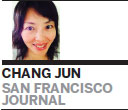Leaders of grassroots civic organizations among Asian Americans should put aside their political differences, unite their constituents, pool their resources and put their heads together to help form a fairer and more constructive society for the well-being of their community.
Most importantly, these organizations should make the well-being of the community their top priority, and make sure they won't fall victim of partisan factionalism or drift into becoming political tools to be manipulated by any political parties or special interest groups.
 The year 2014 has been something of a rocky road for Asian Americans. On Jan 30 the California State Senate passed the controversial Senate Constitutional Amendment No 5 (SCA-5), by a two-thirds majority. Many Asian-American families regarded the bill as promoting racial discrimination and not providing a level playing field for every student in California.
The year 2014 has been something of a rocky road for Asian Americans. On Jan 30 the California State Senate passed the controversial Senate Constitutional Amendment No 5 (SCA-5), by a two-thirds majority. Many Asian-American families regarded the bill as promoting racial discrimination and not providing a level playing field for every student in California.
Written by Senator Ed Hernandez, the bill proposed letting public education institutions such as the University of California (UC), the California State University (CSU) system and even K-12 schools take race, sex, ethnicity or national origin into consideration when admitting students or hiring employees.
The passage of SCA-5 caused a stir in Asian communities, with many families worrying that UC and CSU would slap ethnic quotas on enrollment.
The controversy acted like a catalyst instead. It not only inspired Asian Americans in California to take to the streets to express their objections, but it fostered the formation of grassroots civic organizations such as the United for a Better Community (UBC).
Though a young organization, UBC has become a unifying force for those who are not motivated by partisan politics, but are nevertheless level-headed and focused on helping elect Chinese-American candidates and those candidates who have a track record of advancing Chinese-American interests in the US, said Charles Liu, president of UBC.
The political enthusiasm of these volunteers and the ever-growing population of Asian Americans are two positive factors which will help lay a solid foundation for our playing a bigger and more important role in civic and public affairs, said Henry Yin, vice-chair of the Asian Pacific Islander American Public Affairs Association. "This is something we wouldn't dare imagine 40 years ago."
For Amy Xu, a UBC council member, her involvement in the 2014 mid-term elections was nothing short of "life-changing". For the first time in her life, the seasoned businesswoman walked down alleys and lanes in the scorching sun, knocked on doors, told residents about the candidates UBC endorsed and passed out candidates' campaign literature.
In a speech at a year-end party last week, Charles Liu highlighted several achievements of UBC: hosting a fund-raiser for Ted Lieu, a Democrat who ultimately won the congressional race in District 28; a fundraiser for Mike Honda, who has a proven track record as an ally of Chinese Americans; and endorsing Kansen Chu, who became the first first-generation Chinese American to win a California State Assembly seat.
"We only endorse those candidates who we are confident will help safeguard our Asian Americans' fundamental interests," said Liu.
On the future, Liu said UBC needs to get better organized internally to grow, better define its mission and short term and operational goals and learn from other more established organizations.
New Chinese immigrants who have good educational backgrounds are very capable people and many of them want to be leaders themselves and break into smaller groups because they insist on doing things their own way, Liu warned.
"So how to build a better structure and find ways for different opinions to be respected, resolve conflicts and maintain the integrity of the organization all at the same time becomes the challenge of many Chinese organizations with capable people, who usually have strong egos," he added.
Asian Americans need to remember that solidarity is power. "Regardless of the differences in your demographic background or political preferences, we should unite more closely as one group on one mission," said Amy Xu. "That is ensuring the well-being of our people and our next generation."
Contact the writer at junechang@chinadailyusa.com.